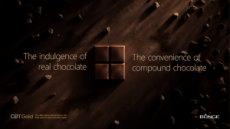New regulations back drive for quality chocolate in China
equipped to choose higher quality chocolate if new regulations
entering into force next month are properly enforced.
China's ministry of commerce has said that the fat content in chocolate must be made up of at least 95 per cent cocoa butter. Any products containing more than 5 per cent cocoa butter replacement cannot be labelled as chocolate after 1 December. Currently only black and white chocolate must be labelled with the proportion of cocoa content, which must be a minimum of 18 per cent and 20 per cent respectively. Under the new regulation, to be policed by the quality and safety body AQSIQ, manufacturers must specify the proportion of cocoa substitute and type. The law could significantly shake up the domestic confectionery sector. Only about a quarter of chocolate products on the market are made with pure cocoa butter, according to Chen Guoxing from the confectionery committee of China's Food Industry Association. Others estimate that 90 per cent of Chinese chocolate makers rely on cocoa butter substitutes. This is a result of the significant price differential - a ton of cocoa costs around RMB30,000 while cocoa substitutes range from 6,000-15,000 depending on its quality and type. Some in the industry are sceptical about how well the regulation will be enforced, particularly given its impact on the domestic industry. Jimmy Yang of Palsgaard, an emulsifier supplier to chocolate makers, adds that it will be a difficult standard to police. "It's not so easy to analyse cocoa butter content in a chocolate product," he told AP-Foodtechnology.com. However many feel that China's confectionery industry is already moving towards higher quality products, independently of government regulation. The world's biggest chocolate maker, Barry Callebaut, says the Chinese market has been buying increasing amounts of higher quality product for some time. "This [the new regulation] is a positive move towards quality but it is the market that is driving this trend ahead of any regulations," Maurizio Decio, the firm's vice president of Asia, told AP-Foodtechnology.com in a recent interview. He added that the firm's gourmet business - selling chocolate to artisans, hotels and restaurants - is growing 'really, really strongly', another indication of the good demand for higher end products. Others in the industry agree. "Chinese customers are more and more concerned about quality as well as price. As a result, in order to better satisfy people's taste, more producers will use pure cocoa butter instead of substitute which has been adopted by most local companies," Chen from the food industry association said. Shanghai-based confectionery firm Jinsihou says all of its new products are made with pure cocoa butter. "We used to use substitute for most of our chocolates, like many Chinese companies. But the new types of our products are made of pure cocoa butter, which is becoming more and more trendy," said company spokesman Mr Zinghong. He acknowledged that ingredient costs have since doubled but that Jinsihou does not want to be confined to a small section of the market. "We believe it is the trend that customers will prefer better quality products as they get rich," he told AP-Foodtechnology.com. The new regulations will be one of many topics under discussion at the Confectionery Manufacturing Expo running in Shanghai this week. Additional reporting by Pan Yan












